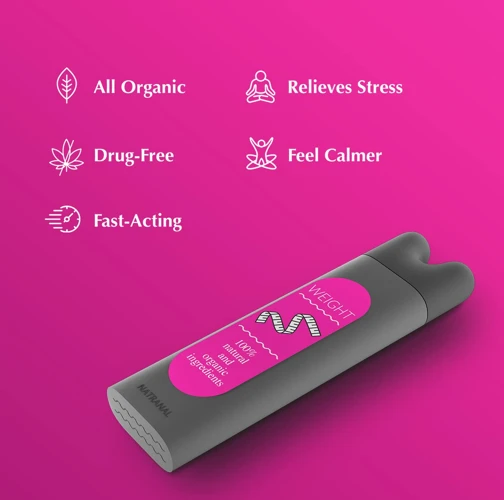Do you feel overwhelmed and stressed? Do you often find yourself giving in to unhealthy cravings? If so, you might be interested in exploring the benefits of aromatherapy. Aromatherapy is a powerful tool that uses essential oils to promote relaxation, reduce stress, and even curb cravings. It’s a natural and safe alternative to traditional methods of stress management and weight loss. In this article, we’ll explore the basics of aromatherapy, the best essential oils for reducing stress and curbing cravings, and how to properly use aromatherapy techniques to promote a more balanced lifestyle.
What is Aromatherapy?
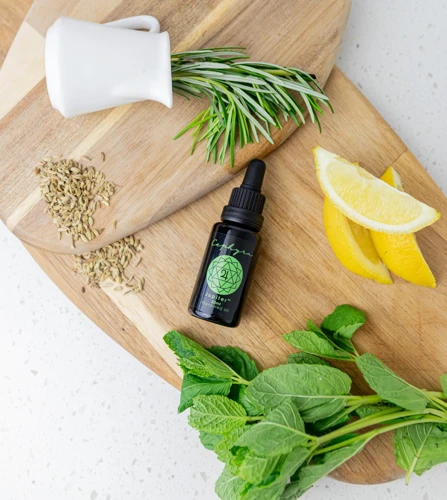
If you’ve heard of or experienced aromatherapy, you may be wondering what exactly it is and how it works. Aromatherapy is a holistic practice that uses essential oils extracted from plants to promote physical, emotional, and mental wellbeing. It involves the use of aromatic plant oils, also known as essential oils, to enhance psychological and physical health. Let’s explore the world of aromatherapy in more detail, from essential oils to its underlying principles.
Essential Oils
Essential oils are natural aromatic compounds that are extracted from plants through distillation or cold pressing. These oils contain the essence or aroma of the plant, and are highly concentrated. They have been used for thousands of years for their therapeutic properties and as natural remedies for a variety of health concerns.
Each essential oil has its own unique composition and properties, which determine its benefits and uses. For example, lavender essential oil is well-known for its calming and relaxing properties, while peppermint essential oil is known for its energizing and invigorating effects.
Here is a table of some of the most commonly used essential oils in aromatherapy, and their properties:
| Essential Oil | Properties |
|---|---|
| Lavender | Calming, relaxing, promotes restful sleep, soothes skin |
| Peppermint | Energizing, invigorating, relieves headaches and nausea, improves digestion |
| Lemon | Uplifting, refreshing, improves mood, boosts immune system, cleansing |
| Bergamot | Calming, mood-balancing, relieves stress and anxiety, improves skin appearance |
| Rosemary | Clarifying, stimulating, improves memory and concentration, relieves respiratory issues |
It’s important to note that essential oils should always be used with caution, as they are highly concentrated and can be toxic if used improperly. It’s important to always dilute essential oils properly before using them on the skin or inhaling them, and to avoid using certain oils during pregnancy or if you have certain health conditions.
How Aromatherapy Works
Aromatherapy is a holistic healing approach that utilizes the therapeutic properties of essential oils. These oils are extracted from various plants and herbs and are used for their fragrant and therapeutic properties.
The way aromatherapy works is through the inhalation or absorption of essential oils into the bloodstream, which then affects the limbic system in the brain.
The limbic system is responsible for regulating emotions, behavior, and memory. When essential oils are inhaled or absorbed, they stimulate the olfactory nerves located in the nose, which then transmit signals to the limbic system to produce a response.
Essential oils are also said to have an effect on the autonomic nervous system, which controls the body’s automatic functions such as heart rate, breathing, and digestion.
Different essential oils have different effects on the body and mind. For example, lavender is known for its calming and relaxing properties, while peppermint is known for its uplifting and energizing effects.
Through the use of aromatherapy, individuals can experience benefits such as reduced stress and anxiety, improved mood, and a sense of overall wellbeing.
| How Aromatherapy Works |
|---|
| Aromatherapy utilizes essential oils for their therapeutic properties. |
| Essential oils are inhaled or absorbed into the bloodstream, which affects the limbic system in the brain. |
| Essential oils can also have an effect on the autonomic nervous system which controls automatic bodily functions. |
| Different essential oils have different effects on the body and mind. |
| Aromatherapy can provide benefits such as reduced stress and anxiety, improved mood, and overall wellbeing. |
Aromatherapy for Reducing Stress
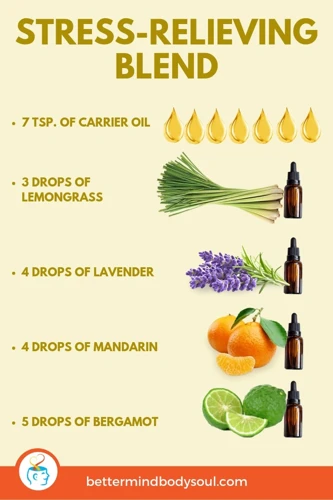
Modern life can often be overwhelming, leading to stress and anxiety that can lead to unhealthy habits such as overeating and indulging in cravings. Aromatherapy, the use of essential oils to promote physical and emotional health, is a natural and effective way to manage stress levels and support a more balanced lifestyle. By harnessing the power of plants, aromatherapy offers unique therapeutic benefits that can help reduce stress, support relaxation and promote overall well-being. In this section, we will explore the best essential oils for reducing stress, and how to use them to create a more peaceful and harmonious environment.
Stress and Cravings
Stress and cravings have a complicated relationship. Stress can lead to unhealthy cravings, and giving in to those cravings can actually increase stress levels. Stress stimulates the release of hormones, such as cortisol and adrenaline, which can increase our appetite and cause us to crave sugary, fatty, and high-calorie foods.
On the other hand, certain foods can help reduce stress, such as those rich in omega-3 fatty acids, magnesium, and tryptophan. However, when we’re stressed, we often reach for comfort foods that are high in sugar and fat, which may bring temporary pleasure but can contribute to long-term health problems.
This is where aromatherapy comes in as a natural and effective way to reduce stress and help curb cravings. By inhaling certain essential oils, we can calm our mind, reduce our stress levels, and reduce the desire for unhealthy foods.
Aromatherapy can be a powerful tool to help break the stress-craving cycle and promote a healthier lifestyle. Let’s take a look at the best essential oils for reducing stress and curbing cravings, and how to use them effectively.
Best Essential Oils for Reducing Stress
Reducing stress is one of the most popular uses of aromatherapy. There are various essential oils that are known for their calming and relaxing properties. Here are some of the best essential oils for reducing stress:
- Lavender oil: Known for its calming effect, lavender oil is often used to reduce anxiety and promote relaxation. It is also believed to help improve sleep and reduce symptoms of depression.
- Chamomile oil: Chamomile oil is another popular oil for reducing stress. It has a calming effect on the mind and body, making it a great choice for promoting relaxation and reducing anxiety.
- Bergamot oil: Bergamot oil is often used for its uplifting and calming properties. It can help reduce symptoms of stress and anxiety, while also promoting a positive mood.
- Ylang ylang oil: Ylang ylang oil is known for its soothing and relaxing properties. It can help reduce stress, anxiety, and tension, and promote relaxation.
- Vetiver oil: Vetiver oil is believed to have a grounding effect on the mind and body, making it a great choice for reducing stress and promoting relaxation.
When using essential oils for stress reduction, it’s important to choose high-quality oils that are pure and free of synthetic additives. Additionally, always dilute essential oils properly before use and perform a patch test to check for any adverse reactions.
How to Use Essential Oils for Stress Reduction
Using essential oils for stress reduction can be a powerful technique. Here are various ways to use them:
| Method | Description |
|---|---|
| Aromatherapy Diffuser | Place a few drops of essential oil in an aromatherapy diffuser and breathe in the calming aroma as it spreads through the room. |
| Inhalation | Add a few drops of essential oil to a bowl of hot water, cover your head with a towel, and inhale the steam. |
| Bath | Add a few drops of essential oil to a warm bath and enjoy the relaxation as the scent fills the air. |
| Massage | Mix essential oils with a carrier oil, such as almond or coconut oil, and use for a calming massage. |
| Topical Application | Apply a few drops of essential oil to your wrists or temples for a stress-reducing effect. |
It is important to note that essential oils should not be applied directly to the skin without dilution with a carrier oil. Additionally, it is recommended to do a patch test before using any new essential oil to ensure that you are not allergic or sensitive to it.
Aromatherapy for Curbing Cravings
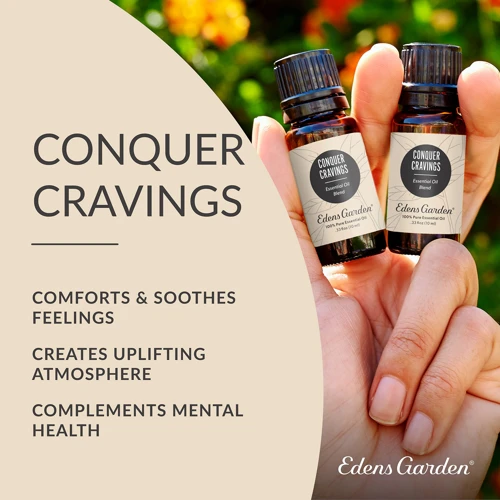
If you’re someone who struggles with cravings, you know how difficult it can be to resist the temptation to indulge. From sweet treats to salty snacks, our bodies can crave all sorts of things that aren’t necessarily good for us. However, there is a natural way to curb those cravings – with aromatherapy. Using essential oils can help manage appetite and prevent overeating, ultimately leading to weight loss. But which essential oils are the best for controlling cravings, and how can they be used effectively? Let’s explore the answers to those questions and more in this section on aromatherapy for curbing cravings.
Cravings and Appetite Control
Cravings and appetite control are two significant factors that come into play when it comes to weight management. Our cravings are often triggered by stress, lack of sleep, and emotions, leading to overeating, which eventually leads to weight gain. Essential oils can help in curbing cravings and controlling appetite by reducing stress levels and regulating emotions.
Some of the best essential oils for curbing cravings include:
- Lemon oil
- Grapefruit oil
- Peppermint oil
- Bergamot oil
- Fennel oil
These essential oils work by curbing your appetite and satiating your hunger, which can keep you from snacking unnecessarily. They also help in reducing your cravings and preventing binge-eating.
Here are ways you can use essential oils to control your cravings:
- Diffusion: You can use an essential oil diffuser to diffuse these oils in your living space to create a calming and soothing atmosphere.
- Inhaling: You can inhale the aroma of these oils directly from the bottle a few times a day to help control your cravings.
- Topical Application: Dilute a few drops of these oils in a carrier oil and apply them topically to your pulse points or the soles of your feet to help with appetite control.
It is essential to use quality essential oils and talk to a professional before using them for weight management purposes. Understanding the right method of application and safety precautions is crucial for effective use of essential oils.
Best Essential Oils for Curbing Cravings
When it comes to curbing cravings, there are certain essential oils that are known to be particularly effective. Here are the best essential oils for curbing cravings and how they work:
| Essential Oil | How it Works |
|---|---|
| Lemon oil | Helps to reduce sugar cravings and increase energy levels. |
| Peppermint oil | Helps to reduce appetite, especially for sweet and fatty foods, and can also improve digestion. |
| Grapefruit oil | Helps to reduce cravings for sugar and other unhealthy foods, and can also boost metabolism. |
| Bergamot oil | Helps to reduce stress levels, which can often trigger cravings, and can also help to improve mood. |
| Cinnamon oil | Helps to regulate blood sugar levels, which can reduce cravings for sugar and other high-carbohydrate foods. |
It’s important to note that while essential oils can be effective in curbing cravings, they should be used in conjunction with a healthy diet and regular exercise. Additionally, it’s always a good idea to consult with a healthcare professional before using essential oils for any health-related purposes.
How to Use Essential Oils to Control Cravings
Controlling cravings is a crucial step in weight management, and essential oils can be used effectively for this purpose. Here are a few ways to use essential oils to control cravings:
- Aromatherapy Diffusion: One of the simplest ways to use essential oils for controlling cravings is through aromatherapy diffusion. Add a few drops of your favorite essential oil to a diffuser, turn it on, and breathe in the aroma. Some of the best essential oils for this purpose are peppermint, bergamot, and grapefruit.
- Inhalation: You can also inhale essential oils directly from the bottle or by adding a few drops to a tissue or cotton ball. This method is particularly useful when you’re on the go and don’t have a diffuser on hand.
- Topical Application: Applying essential oils to the skin is another effective way to control cravings. Mix a few drops of your chosen essential oil with a carrier oil such as coconut or almond oil and massage onto your temples, wrists, or the back of your neck. This can be done throughout the day or whenever you feel a craving coming on. Some of the best essential oils for topical application are peppermint, grapefruit, and bergamot.
- Aromatherapy Jewelry: Aromatherapy jewelry, such as diffuser bracelets or necklaces, can also be used to control cravings. Simply add a few drops of your desired essential oil to the jewelry and wear it throughout the day. This is a discreet and convenient way to benefit from the aromatherapeutic properties of essential oils.
Remember to always follow proper dilution guidelines when using essential oils topically to avoid skin irritation.
Other Aromatherapy Techniques for Weight Loss
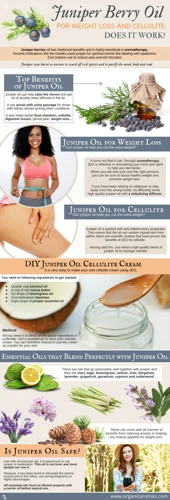
There are many innovative techniques that use aromatherapy to aid in weight loss beyond the scope of simply reducing stress and curbing cravings. Incorporating these lesser-known techniques can contribute to a holistic and effective approach to weight loss. Here are some additional powerful methods of aromatherapy that can be easily integrated into your weight loss routine.
Aromatherapy Massage
One popular technique for using essential oils in aromatherapy is through a massage. Aromatherapy massage involves the use of essential oils mixed with a carrier oil to create a massage blend that is applied to the skin. The massage therapist will use various techniques to massage the skin, allowing the oils to penetrate and release their therapeutic properties.
The Benefits
Aromatherapy massage can provide numerous benefits beyond just relaxation. Firstly, the act of massage itself can help to reduce muscle tension and improve circulation which can relieve physical symptoms of stress. Combining this with the use of essential oils allows for added relaxation and stress relief.
The Oils
Different oils can be used for different purposes in an aromatherapy massage. For example, lavender oil is known for its calming properties, while peppermint oil can be invigorating and help to relieve tension headaches. Other popular essential oils for massage include eucalyptus, rose, and ylang-ylang.
The Technique
To perform an aromatherapy massage, the massage therapist will mix a few drops of essential oil with a carrier oil such as jojoba, coconut or almond oil. The blend is then applied to the skin, and the therapist will use long sweeping motions with light to medium pressure to massage the oil into the skin. The massage can be tailored to the individual’s preferences, with the therapist focusing on areas of the body where tension is most commonly held.
Precautions
While aromatherapy massage can be an effective way to reduce stress, it is important to take precautions when using essential oils. Some oils may be irritating to the skin, especially if they are used undiluted. It is also important to be aware of any allergies you may have to certain oils. Always do a patch test before using an essential oil for the first time and never ingest essential oils unless under the strict guidance of a healthcare professional.
Aromatherapy massage is a popular technique for reducing stress and promoting relaxation. By using different essential oils, each massage can be tailored to meet individual needs and preferences. However, it is important to take precautions and use essential oils safely to avoid any adverse reactions.
Aromatherapy Inhalation
One way to use aromatherapy for weight loss is through inhalation. This method involves breathing in the fragrance of essential oils, allowing the scent to stimulate the brain and promote relaxation or appetite control depending on the oil used. There are several ways to practice inhalation therapy:
| Method | Description |
|---|---|
| Cotton ball | Place 2-3 drops of essential oil on a cotton ball and inhale the fragrance deeply for several breaths. |
| Diffuser | Add a few drops of essential oil to a diffuser filled with water and let the scent permeate the air. |
| Steam inhalation | Add a few drops of essential oil to a bowl of hot water, cover your head with a towel and inhale the scented steam for a few minutes. |
When inhaling essential oils, it is important to choose the right oil to achieve the desired effect. For reducing stress and promoting relaxation, lavender, chamomile, and bergamot oils are good options. These oils have calming properties that can help reduce stress levels, decrease anxiety, and promote better sleep. On the other hand, for curbing cravings and improving appetite control, peppermint, grapefruit, and cinnamon oils are recommended. These oils have invigorating properties that can help reduce hunger pangs, increase energy, and improve focus.
It is essential to follow safety precautions when using inhalation therapy. Overexposure to certain essential oils can cause headaches, dizziness, nausea, and skin irritation. It is recommended to dilute the essential oil in a carrier oil or use a diffuser with proper ventilation. Pregnant women and individuals with asthma or other respiratory conditions should consult a healthcare professional before using inhalation therapy.
Aromatherapy inhalation can be an effective tool for weight loss when used properly and in conjunction with other healthy habits such as regular exercise and a balanced diet.
Aromatherapy Baths
Aromatherapy baths are a great way to unwind and relax while reaping the benefits of essential oils. Here’s a step-by-step guide on how to create an aromatherapy bath:
| Step | Instruction |
|---|---|
| 1 | Fill your bathtub with warm water. |
| 2 | Add 10-20 drops of your chosen essential oils to the bathtub. Mix the oils into the water by swishing your hand around in the tub. |
| 3 | Get into the bathtub and soak for at least 20 minutes. |
| 4 | As you soak, take deep breaths to inhale the aromas of the essential oils. |
| 5 | Once you’re finished, drain the bathtub and rinse off any oils on your skin. |
Aromatherapy baths can be incredibly therapeutic and relaxing, and can be particularly helpful in reducing stress and curbing cravings. Some popular essential oils for use in a bath include lavender for stress relief, peppermint for headache relief, and ylang-ylang for relaxation.
It’s important to note that essential oils are highly concentrated and should be diluted before being used directly on the skin. In a bath, the oils are diluted by the water and should not cause any irritation. However, it’s important to be cautious when using essential oils and to always read the safety information and usage instructions before use.
An aromatherapy bath is a wonderful way to enhance your relaxation and self-care routine. By adding essential oils to your bath, you can enjoy the benefits of aromatherapy while soaking away stress and tension.
Precautions
When it comes to using essential oils for aromatherapy, it is important to take certain precautions to ensure safety and effectiveness. Essential oils can be powerful and potent, so it is crucial to use them properly to avoid any negative reactions or side effects. In this section, we will discuss some essential precautions to keep in mind when using aromatherapy for stress reduction and curbing cravings. It is important to note that these are general guidelines and it is always recommended to consult with a healthcare professional before using essential oils as part of any treatment plan.
Essential Oil Safety
When using essential oils for aromatherapy purposes, it is important to keep in mind certain safety precautions to avoid any adverse effects. Here are some essential oil safety tips to keep in mind:
- Dilute properly: Essential oils are highly concentrated and should always be diluted before use. Undiluted essential oils can cause skin irritation or sensitization. Dilute with a carrier oil such as coconut oil or almond oil.
- Do not ingest: Essential oils should not be taken orally unless under the guidance of a trained aromatherapist or healthcare provider. Ingesting some essential oils can be toxic and cause serious health problems.
- Do not apply directly to the skin: Essential oils should not be applied directly to the skin unless they have been properly diluted. Always do a patch test to check for any allergic reactions before applying to larger areas of the skin.
- Keep out of reach of children and pets: Essential oils should be kept out of the reach of children and pets. Some essential oils can be toxic if ingested or cause skin irritation if applied improperly.
- Avoid using during pregnancy: Some essential oils should be avoided during pregnancy as they can cause uterine contractions or harm to the developing fetus.
- Store properly: Essential oils should be stored in a cool, dark place and kept in tightly sealed bottles. Exposure to light, heat, or air can cause the oils to break down and lose their effectiveness.
By following these essential oil safety guidelines, you can safely and effectively use aromatherapy to reduce stress and curb cravings.
Conclusion
In conclusion, aromatherapy can be a beneficial tool for reducing stress and controlling cravings. Essential oils have been used for thousands of years for their therapeutic properties, and modern research has shown their effectiveness in promoting relaxation and reducing anxiety.
When it comes to stress reduction, certain essential oils like lavender, bergamot, and chamomile have been shown to be particularly effective. These oils can be used in a variety of ways, such as through inhalation, massage, or in a warm bath. By incorporating these oils into your daily routine, you may find that you’re better able to manage stress and avoid turning to unhealthy coping mechanisms like overeating or smoking.
Similarly, using certain essential oils like grapefruit, peppermint, and cinnamon can help curb cravings and promote healthy appetite control. These oils can be used in a diffuser, applied topically, or even added to food and beverages. By utilizing these oils, you may find that you’re better able to stick to a healthy eating plan and avoid giving in to unhealthy food cravings.
Of course, it’s important to remember that essential oils are potent substances and should be used with caution. Always do your research and choose high-quality oils from reputable sources. And if you’re pregnant, nursing, or have allergies or other health concerns, it’s best to consult with a healthcare professional before using essential oils.
Incorporating aromatherapy into your weight loss journey can be a helpful way to support your overall health and wellness. By using essential oils for stress reduction and appetite control, you may find that you’re better able to make positive lifestyle changes and achieve your weight loss goals.
Frequently Asked Questions
Can aromatherapy really reduce stress?
Yes. Aromatherapy has been shown to help reduce stress and anxiety levels in some people.
What are the best essential oils for reducing stress?
Lavender, bergamot, chamomile, and ylang-ylang are all popular choices for reducing stress and promoting relaxation.
How do I use essential oils to reduce stress?
You can use a diffuser, apply topically, or add a few drops to a warm bath to enjoy the stress-reducing benefits of essential oils.
Can aromatherapy really help control cravings?
Some people have found that certain essential oils can help reduce cravings and increase feelings of fullness.
What are the best essential oils for curbing cravings?
Peppermint, grapefruit, and cinnamon are all popular choices for curbing cravings and reducing appetite.
How do I use essential oils to curb cravings?
You can inhale the scent directly from the bottle, add a few drops to a diffuser, or apply topically (with a carrier oil) to pressure points.
Can I use aromatherapy as a substitute for traditional weight-loss methods?
No. Aromatherapy can be a helpful supplement to traditional weight-loss methods, but it is not a substitute for a healthy diet and exercise.
Is it safe to use essential oils on my skin?
Some essential oils can be irritating to the skin, so it’s important to dilute them with a carrier oil before applying directly to your skin.
Can aromatherapy be harmful in any way?
Essential oils can be toxic if ingested or used improperly, so it’s important to use caution and follow proper safety guidelines.
Is aromatherapy safe for pregnant or breastfeeding women?
Some essential oils can be harmful during pregnancy or while breastfeeding, so it’s best to consult with a doctor or qualified aromatherapist before using aromatherapy during these times.

